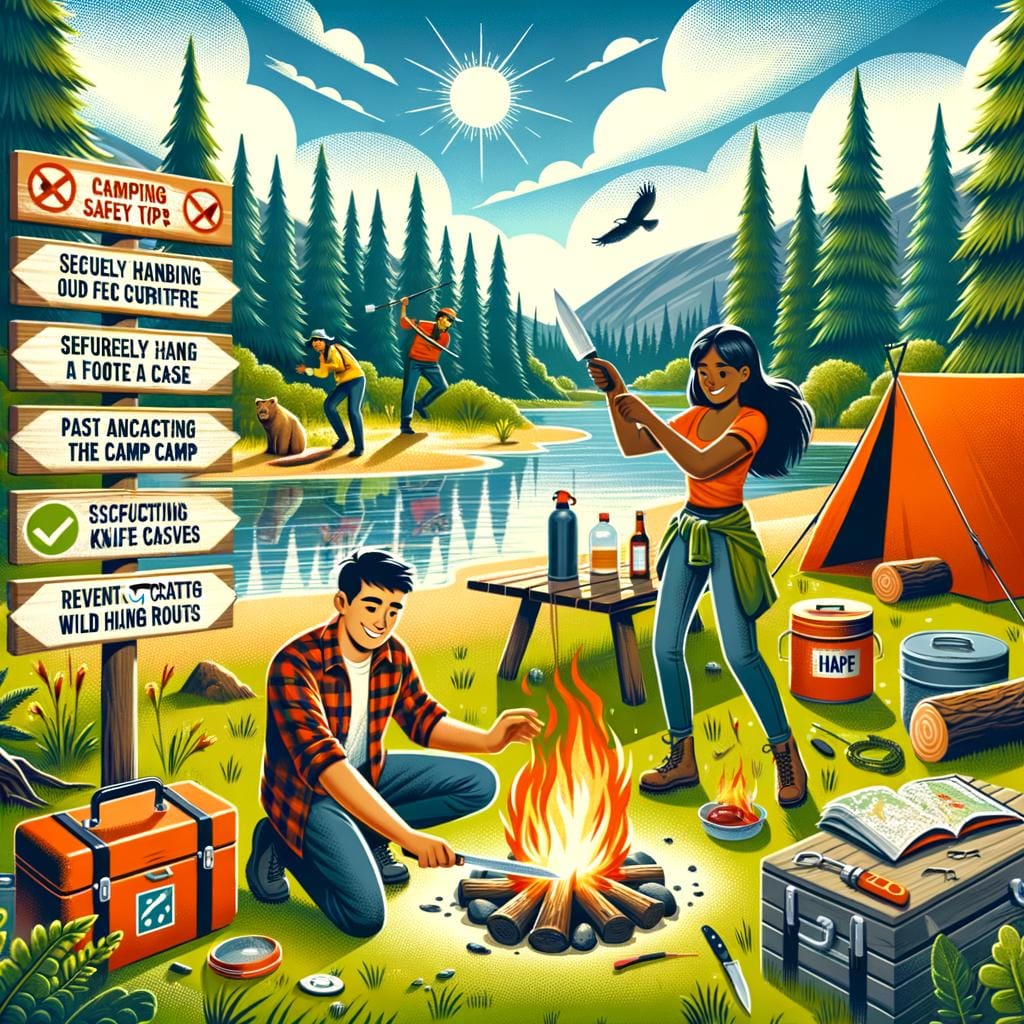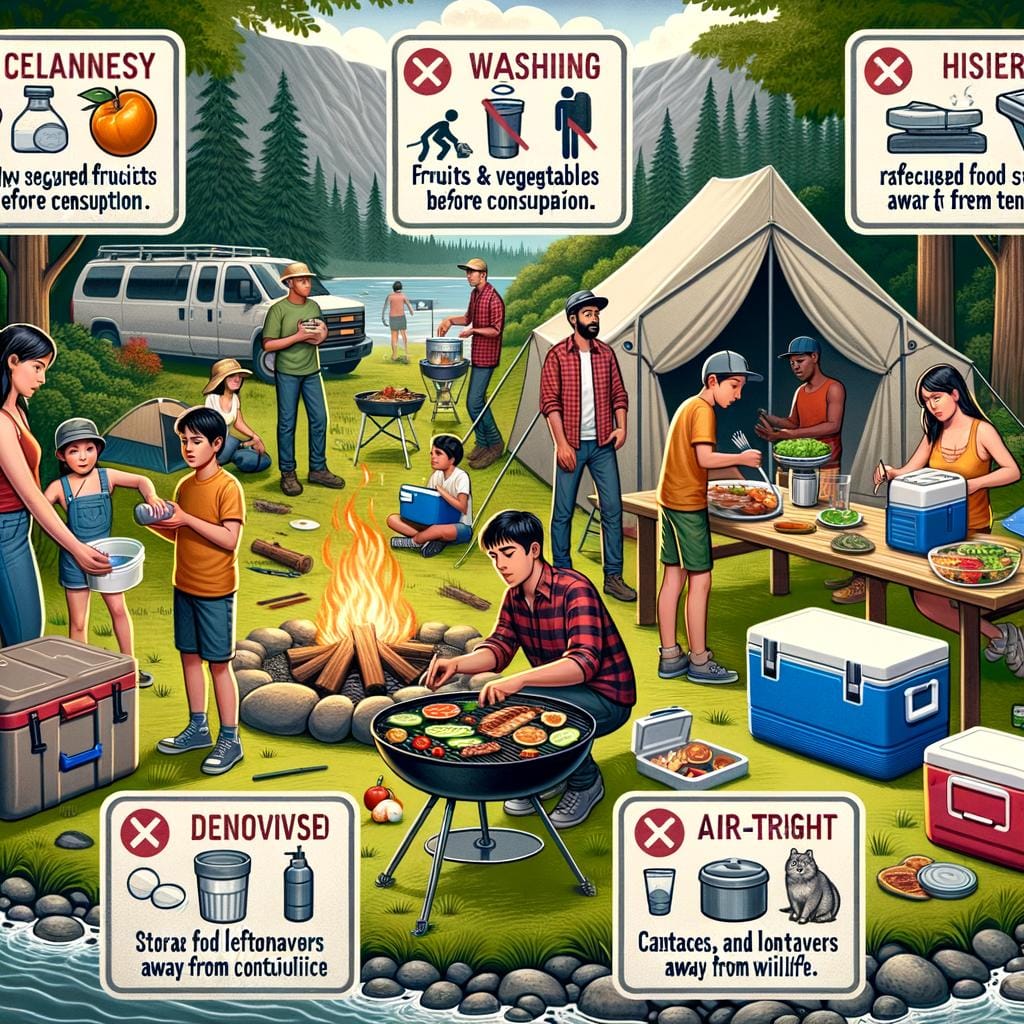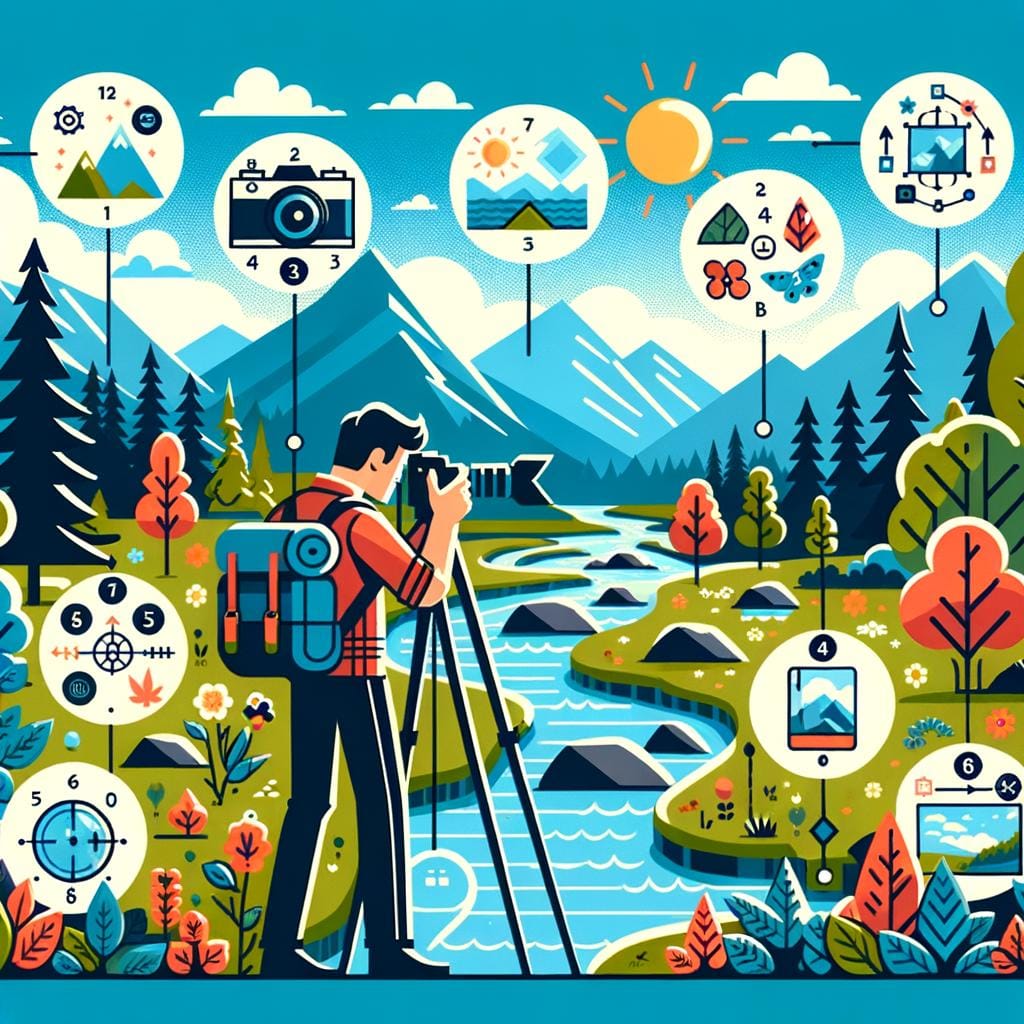Camping safety tips are crucial for any outdoor adventure to ensure a safe and enjoyable experience. Whether you are a novice camper or an experienced outdoor enthusiast, being prepared and informed about potential risks can make all the difference in the wilderness. From selecting the right campsite to knowing how to handle wildlife encounters, this article will cover essential guidelines to help you stay safe during your camping trip.
One of the first steps in ensuring your safety while camping is choosing the right campsite. Factors such as terrain, proximity to water sources, and potential hazards like falling rocks or unstable ground should be taken into consideration when setting up camp.
Additionally, having the necessary gear and equipment can play a significant role in keeping you safe and comfortable throughout your journey. From sturdy tents to reliable communication devices, being prepared with the right tools can make a world of difference in case of emergencies.
Once you have selected a suitable campsite and gathered your essential gear, it is crucial to set up camp safely. Properly pitching your tent and following campfire guidelines can prevent accidents and injuries during your stay in the wilderness.
Furthermore, food safety is another important aspect to consider while camping, as improper storing and preparing of food can attract wildlife and pose health risks. By following these camping safety tips, you can enjoy nature responsibly while minimizing risks and maximizing enjoyment during your outdoor adventure.
Selecting the Right Campsite for Safety
When it comes to ensuring a safe camping trip, selecting the right campsite is crucial. Here are some important factors to consider when choosing a campsite to ensure your safety:
- Location: Choose a campsite that is not too close to cliffs, bodies of water, or areas prone to flooding. Avoid setting up camp under dead trees or large branches that could fall.
- Accessibility: Ensure that the campsite is easily accessible and not too far from help in case of an emergency. Consider the terrain and proximity to hiking trails or other recreational activities.
- Safety hazards: Look out for potential safety hazards such as loose rocks, steep slopes, or poisonous plants. Avoid setting up camp in areas with high fire risk or where wildlife activity is common.
It’s also important to follow any guidelines or regulations set by the park or campground you are staying at. Pay attention to designated camping areas and respect any restrictions in place for your safety and the protection of the environment.
Remember that choosing the right campsite sets the foundation for a safe and enjoyable outdoor adventure. By being mindful of your surroundings and selecting a site that prioritizes safety, you can better enjoy your time in nature without unnecessary risks.
Essential Gear and Equipment for a Safe Camping Trip
When planning a camping trip, it is crucial to ensure you have the essential gear and equipment to stay safe in the great outdoors. From shelter to navigation tools, having the right items can make a significant difference in your overall camping experience. Here are some key essentials to pack for a safe camping trip:
Shelter
One of the most important pieces of gear for camping is a high-quality tent. Make sure your tent is sturdy, waterproof, and properly sized for your group. Additionally, bring along extra stakes and guy lines for added stability in case of windy conditions. A tarp or footprint under your tent can provide an extra layer of protection from moisture on the ground.
Navigation
In unfamiliar terrain, it’s crucial to have reliable navigation tools on hand. Invest in a good map of the area you’ll be camping in and consider bringing a compass or GPS device to help you stay on track during hikes or exploring excursions. Familiarize yourself with how to read maps and use these tools before heading out into the wilderness.
Lighting and Fire-Starting Supplies
Adequate lighting is essential for nighttime activities around camp or emergency situations. Pack headlamps, flashlights, extra batteries, and lanterns to ensure visibility after dark. Additionally, bring fire-starting supplies such as matches, lighters, and fire starters for cooking food and staying warm at night. Remember always to practice proper fire safety when using open flames in nature.
By packing these essential gear items for your camping trip, you’ll be better prepared to handle unforeseen circumstances and enjoy a safe outdoor adventure. Remember always to research specific needs based on your destination (mountain camping vs beach camping) and familiarize yourself with proper equipment use before embarking on your journey. Stay safe by being well-prepared.
Setting Up Camp Safely
Choosing the Right Location for Your Tent
When setting up camp, it is crucial to choose a suitable location for pitching your tent. Look for a flat and level area where water won’t pool in case of rain. Avoid setting up camp under dead or overhanging branches that could potentially fall on your tent.
Also, make sure to check for ant hills or other insects that could cause problems during your stay. By selecting a proper camping spot, you can ensure a safe and comfortable night’s sleep.
Fire Safety Guidelines
Campfires are an essential part of the camping experience, but they also pose a significant risk if not handled properly. When building a campfire, always clear the area around it of any debris or flammable materials. Keep a bucket of water or sand nearby to quickly extinguish the fire if necessary.
Never leave a campfire unattended, and always fully extinguish it before going to bed or leaving the campsite. Following these fire safety guidelines can help prevent accidents and wildfires while camping.
Properly Storing Food and Fragrant Items
Ensuring your food and other fragrant items are stored properly can help prevent unwanted encounters with wildlife such as bears and raccoons. Use bear-proof containers or hang food bags in designated areas away from your campsite to keep animals at bay. Additionally, avoid bringing strong-smelling items like lotions or perfumes into your tent as they may attract curious critters. By taking these precautions, you can minimize the risk of wildlife encounters and enjoy a safer camping experience overall.
By following these tent pitching and campfire guidelines, along with practicing proper food storage techniques, you can enhance your camping safety and enjoy peace of mind during your outdoor adventure. Remembering these key tips will not only help protect you and your fellow campers but also preserve the environment for future generations to appreciate nature in its pristine state.
Food Safety
When embarking on a camping trip, ensuring food safety is crucial to preventing illnesses and enjoying a stress-free outdoor adventure. Here are some important tips for storing and preparing food in the wilderness:
- Store perishable items in airtight containers or coolers with ice packs to maintain freshness and prevent bacteria growth. Keep raw meats separate from ready-to-eat foods to avoid cross-contamination.
- Cook all meats, poultry, and fish thoroughly to kill harmful bacteria. Use a food thermometer to ensure that they reach the recommended internal temperature. Avoid eating raw or undercooked foods while camping.
- Practice good hygiene when handling food by washing your hands with soap and water before cooking or eating. Bring hand sanitizer for situations where access to clean water is limited.
In addition to proper food storage and preparation, it is essential to follow safe cooking practices while camping:
- Use designated cooking areas away from tents and combustible materials to prevent accidental fires. Never leave cooking appliances unattended while in use.
- Extinguish campfires completely after use and follow local regulations for open flames. Store all food securely overnight to deter animals from scavenging.
- Dispose of food waste properly by packing out all trash or using bear-proof containers if camping in bear country. Leaving scraps behind can attract wildlife and pose risks to both campers and animals.
By following these food safety tips and guidelines for preparing meals in the wilderness, campers can minimize health risks and enjoy a safe and satisfying camping experience surrounded by nature’s beauty.
Wildlife Safety
When camping in the wilderness, it is crucial to be aware of potential wildlife encounters, especially in areas known for bears and snakes. To ensure your safety and the safety of others around you, it is essential to follow some key tips and guidelines.
One important tip for camping in bear country is to properly store your food to avoid attracting these animals to your campsite. Using bear-proof containers or hanging food from a tree out of reach can help prevent unwanted encounters. Additionally, it is important to keep a clean campsite, free of any food scraps or strong-smelling items that may attract bears.
When it comes to snake safety, being cautious and observant while hiking or setting up camp can help reduce the risk of encountering venomous snakes. Be sure to watch where you step, especially in rocky areas or tall grass where snakes may hide. If you do come across a snake, give it space and slowly back away to avoid any potential bites.
By following these wildlife safety tips and being prepared with knowledge on how to react in these situations, you can enjoy your camping trip with peace of mind knowing that you are taking the necessary precautions to stay safe in bear and snake country. Remember, respecting the wildlife and their habitats is crucial for both their well-being and your own safety while enjoying the great outdoors.
Emergency Preparedness
When venturing into the great outdoors for a camping trip, it is crucial to prioritize your safety by being prepared for emergencies. One of the most important aspects of emergency preparedness is ensuring that you have a well-stocked first aid kit and communication devices on hand at all times.
A first aid kit should include essentials such as bandages, antiseptic wipes, gauze pads, adhesive tape, tweezers, scissors, pain relievers, and any personal medications you may need. It is recommended to customize your first aid kit based on the specific needs of your group and the activities you plan to engage in during your camping trip.
In addition to a first aid kit, having reliable communication devices can be a lifesaver in case of emergencies. Make sure to pack a charged cell phone with extra batteries or a portable charger. However, keep in mind that cell phone service may not always be available in remote camping locations.
Consider bringing along a two-way radio or a satellite phone as alternative communication options. It’s also wise to inform someone back home about your itinerary and expected return date so they can alert authorities if you do not check in as planned.
By prioritizing emergency preparedness with a well-equipped first aid kit and reliable communication devices, you are taking essential steps to ensure your safety while camping. Remember that accidents can happen unexpectedly, so being proactive and prepared can make all the difference in handling emergency situations efficiently. Stay informed about basic first aid procedures and practice safe outdoor habits to promote an enjoyable camping experience while also being ready to respond effectively in case of any unforeseen incidents.
Leave No Trace
When venturing into the great outdoors for a camping trip, it is crucial to remember the importance of environmental conservation and responsible camping practices. Leaving no trace behind means leaving the natural beauty of the wilderness as you found it, so future generations can enjoy it as well. This not only ensures that others can experience the same joys of camping in nature, but also helps protect the delicate ecosystems that are vital to our planet’s health.
One key aspect of practicing Leave No Trace principles is properly disposing of waste. Make sure to bring along trash bags and pack out all garbage, including food scraps and biodegradable items. Avoid burying or burning trash, as this can harm wildlife and pollute the environment. Additionally, be mindful of where you set up camp – choose established campsites whenever possible to minimize your impact on the land.
Another important consideration when camping is to respect wildlife and their habitats. Keep a safe distance from animals and never feed them human food, as this can disrupt their natural behaviors and cause harm to both animals and humans. Be aware of any local regulations regarding wildlife encounters, especially in bear or snake country. Take precautions such as storing food properly, using bear-proof containers if necessary, and carrying bear spray or snake bite kits for emergencies.
By following these Leave No Trace principles and incorporating responsible camping practices into your outdoor adventures, you can help preserve our natural landscapes for future generations to enjoy. Remember that practicing environmental conservation goes hand in hand with ensuring your own safety while camping in the wilderness. By being good stewards of the land and respecting nature, you can have a safe and enjoyable outdoor experience while minimizing your impact on the environment.
Conclusion
In conclusion, incorporating camping safety tips into your outdoor adventures is crucial for a safe and enjoyable experience. By following the guidelines outlined in this article, you can ensure that you are well-prepared for any situation that may arise during your camping trip.
Selecting the right campsite is the first step in ensuring your safety while camping. Choosing a location with level ground, away from hazards like dead trees or cliffs, and close to a water source can help prevent accidents. Additionally, being mindful of wildlife habitats and potential risks can further enhance your safety while in nature.
Equipping yourself with essential gear and knowing how to properly use it is also key to staying safe during your camping trip. From setting up your tent securely to safely starting and extinguishing campfires, taking precautions can prevent accidents and injuries.
Remembering food safety practices, respecting wildlife boundaries, being prepared for emergencies with a first aid kit and communication devices are all important aspects of responsible camping. By following these camping safety tips, you can enjoy the great outdoors while minimizing risks and maximizing enjoyment.
Frequently Asked Questions
What Are the Safety Tips for Camping?
Safety is paramount when camping. It’s important to choose a safe campsite, set up your tent properly, and make sure you have a first aid kit on hand. Always keep a safe distance from wild animals and stay hydrated throughout your trip.
What Are Some of the Do’s and Don’ts in Camping?
When camping, it’s crucial to leave no trace by cleaning up after yourself and not disturbing the natural environment. Do follow campground rules, respect other campers’ privacy, and be mindful of noise levels. On the flip side, don’t leave food out that could attract wildlife or forget to pack essentials like a flashlight or matches.
What Is the Number One Rule of Camping?
The number one rule of camping is to be prepared. This means planning ahead by packing the necessary gear, researching the camping area, and informing someone of your itinerary in case of emergencies. Being prepared can ensure a safe and enjoyable camping experience for yourself and others around you.

An avid outdoor enthusiast, writer, and environmental advocate who has spent over two decades exploring the world’s most breathtaking landscapes. With a background in environmental science and a passion for adventure, Frances combines her love for nature with her talent for storytelling to inspire others to embark on their own outdoor journeys.





